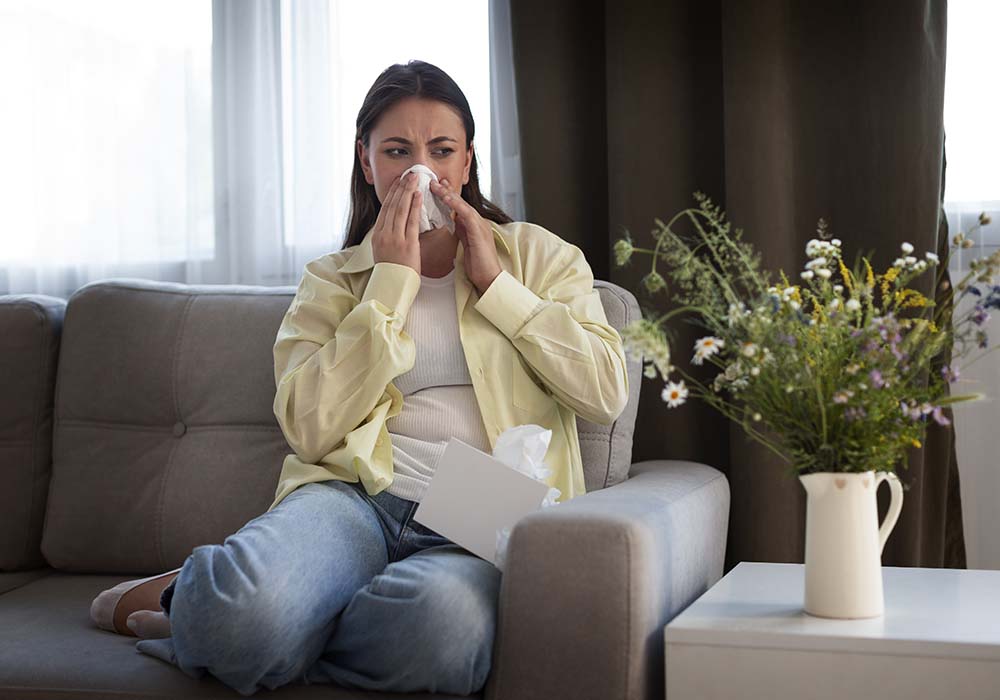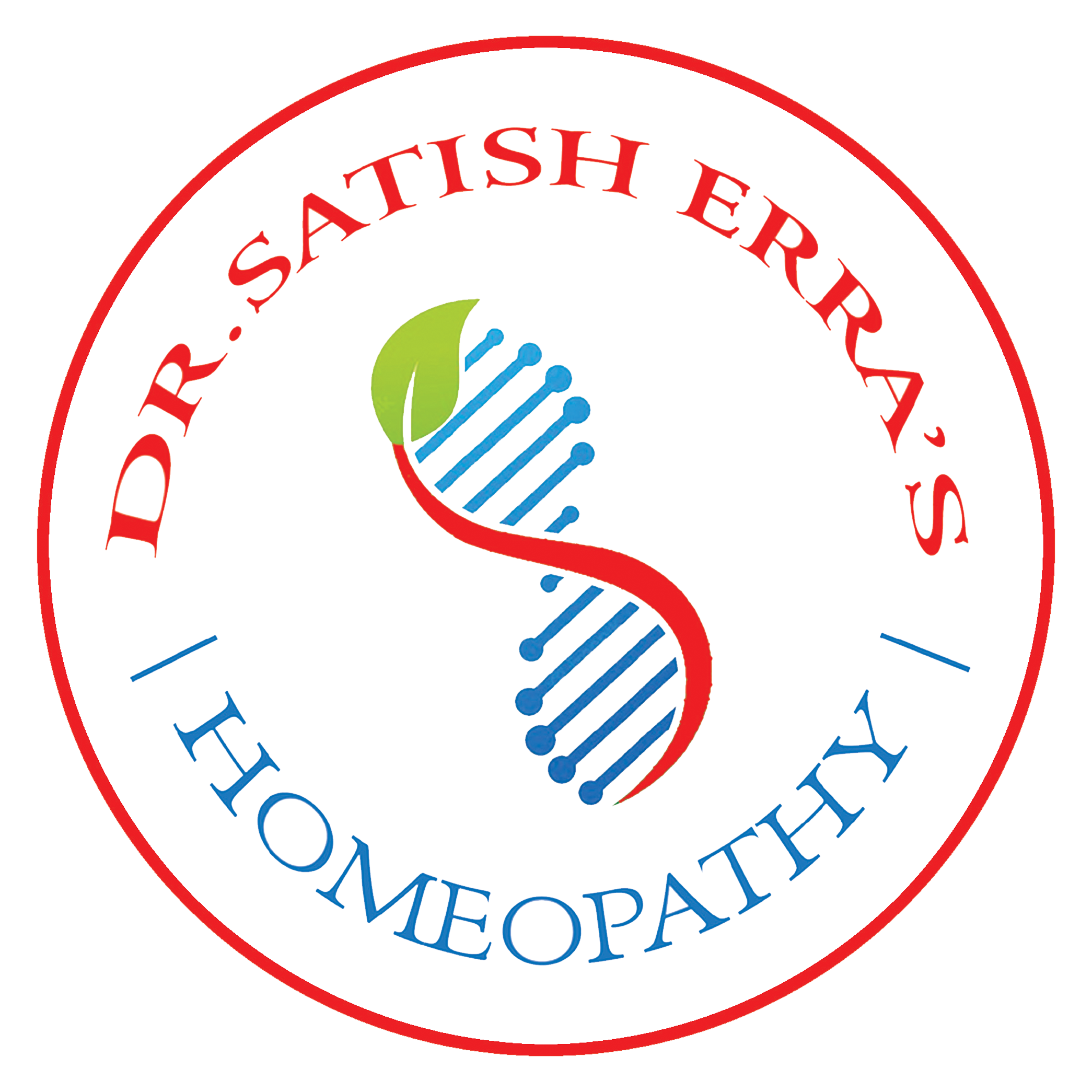Homeopathy Treatment for Allergic Rhinitis
Allergic rhinitis, commonly known as hay fever, is an inflammatory and allergic response condition where the immune system overreacts to allergens in the environment, leading to symptoms such as sneezing, itching, nasal congestion, watery eyes, and runny nose. Finding effective and lasting relief from this condition can be challenging, but homeopathy offers a promising solution. Dr. Satish Erra, a renowned homeopathy specialist, provides comprehensive Treatment for Allergic Rhinitis In Hyderabad.
A person diagnosed with asthma or skin disorders is more prone to allergic rhinitis.

What is allergy?
An allergy is a condition where the immune system abnormally reacts to a foreign substance, called an allergen, which is typically harmless to most people. These allergens can be found in food, the environment, medications, and other sources. When an individual with allergies encounters an allergen, their immune system responds by producing antibodies, specifically immunoglobulin E (IgE), to defend against the perceived threat. The immune system’s response can trigger a range of symptoms, varying from mild discomfort to severe reactions.
Common Allergens | Homeopathy for Sneezing and Runny Nose
Common allergens are substances that can trigger allergic reactions in susceptible individuals. These allergens include pollen, dust mites, pet dander, certain foods like peanuts, shellfish, or dairy, insect stings, mold spores, and specific medications. When a person with allergies comes into contact with an allergen, their immune system mistakenly identifies it as harmful and releases chemicals, such as histamine, into the bloodstream. This response is the body’s attempt to defend against the perceived threat.
The release of these chemicals leads to various allergy symptoms, which can range from mild to severe. Common symptoms include itching, sneezing, a runny nose, watery eyes, coughing, wheezing, and hives. In severe cases, exposure to an allergen can result in anaphylaxis, a life-threatening reaction that requires immediate medical attention. Understanding common allergens and their effects is crucial for managing and preventing allergic reactions.
Homeopathic Approach to Allergy Relief | Understanding Allergic Rhinitis with Homeopathy
Homeopathy treats allergic rhinitis by addressing the underlying causes rather than merely alleviating symptoms. Dr. Satish Erra’s approach focuses on identifying and treating the root cause of the allergy, which leads to more effective and lasting relief. This method strengthens the immune system, reducing its hyperactivity and enabling the body to react normally to allergens.
Dr. Satish Erra’s Homeopathy Treatment for Allergic Rhinitis
Dr. Satish Erra is considered one of the Best Doctors For Allergic Rhinitis Treatment in Hyderabad and across India. His expertise in homeopathy and his personalized treatment plans make him a trusted name for those seeking relief from chronic allergic rhinitis.
- Strengthening the Immune System: Dr. Satish Erra’s treatment aims to restore the immune system to a healthy state. By doing so, it reduces the body’s overreaction to allergens, which is the primary cause of allergic rhinitis symptoms.
- Holistic Health Restoration: Homeopathy works on both the mental and physical planes, ensuring complete restoration of health. Dr. Satish Erra’s approach considers the overall well-being of the patient, addressing not just the symptoms but also the triggers and the patient’s lifestyle.
- Avoiding Trigger Factors: Along with appropriate homeopathic treatment, Dr. Erra emphasizes the importance of avoiding known allergens to reduce acute exacerbations. This combined approach enhances the effectiveness of the treatment.
Types of Allergic Rhinitis
Allergic rhinitis is primarily classified into two types based on the timing and duration of symptoms: Seasonal Allergic Rhinitis and Perennial Allergic Rhinitis.
- Seasonal Allergic Rhinitis (SAR) : Also known as hay fever, SAR occurs at specific times of the year, typically during spring, summer, or fall, when pollen levels are high.
- Perennial Allergic Rhinitis (PAR) : PAR occurs year-round and is often triggered by indoor allergens.
- Occupational Allergic Rhinitis : This type of allergic rhinitis occurs due to exposure to allergens in the workplace.
- Non-Allergic Rhinitis : While not a type of allergic rhinitis, it is worth mentioning non-allergic rhinitis, as it can present similar symptoms but does not involve the immune system’s response to allergens.
Symptoms of Allergies
- Respiratory Symptoms: Sneezing, runny or stuffy nose, itchy or watery eyes, coughing, wheezing, and shortness of breath.
- Skin Reactions: Itching, redness, swelling, hives, or eczema.
- Digestive Symptoms: Nausea, vomiting, diarrhea, or abdominal pain (common with food allergies).
- Anaphylaxis: A severe, life-threatening allergic reaction that can cause difficulty breathing, a drop in blood pressure, and loss of consciousness.
Types of Allergies:
Allergies can manifest in various forms depending on the trigger and the part of the body affected. Here are the most common types of allergies:
- Respiratory Allergies : These allergies affect the respiratory system and are often seasonal or perennial (year-round).
- Allergic Contact Dermatitis | Skin Allergies : These allergies affect the skin and can be caused by various allergens.
- Food Allergies : These allergies are caused by an immune response to specific foods.
- Insect Sting Allergies : These allergies occur when the immune system reacts to venom from stinging insects.
- Drug Allergies : Reactions occur to medications.
- Latex Allergy : An allergic reaction to proteins found in natural rubber latex.
- Pet Allergies : Allergies to proteins found in an animal’s skin cells, urine, or saliva.
- Mold Allergy : Reaction to mold spores found indoors and outdoors.
- Seasonal Allergies : Allergies that occur at certain times of the year, usually when outdoor molds release their spores and trees, grasses, and weeds release tiny pollen particles into the air.
- Allergic Asthma : Allergic asthma is a type of asthma triggered by exposure to allergens such as pollen, mold spores, pet dander, dust mites, or cockroach droppings.
Mastering Allergic Rhinitis: Identifying and Avoiding Triggers for Effective Symptom Management
Identifying and avoiding triggers is essential for effective symptom management. Common triggers include pollen from trees, grasses, and weeds during spring and summer, dust mites found in bedding and upholstery, pet dander from cats, dogs, and rodents, mold spores in damp environments like bathrooms and basements, cockroach droppings in urban settings, outdoor and indoor air pollution from vehicle emissions.
Some other triggers are household chemicals, weather changes such as high humidity promoting mold growth and cold air exacerbating symptoms, strong odors and irritants like perfumes and cigarette smoke, occupational exposures to latex and chemicals, and food allergies, which though less common, can worsen symptoms.
Understanding and minimizing exposure to these triggers can help alleviate allergic rhinitis symptoms and improve overall quality of life.
Most commonly seen symptoms of allergic rhinitis include:
- Frequent sneezing
- Running of nose
- Itching and stuffy nose
- Itching and watering of eyes
- Sore throat
- Fatigue
- Frequent heaviness of skull and headache
Management of allergic rhinitis:
Along with appropriate treatment, avoiding the triggering factors helps in reducing the acute exacerbation of the disease. Complete restoration of health at both mental and physical plane can be achieved through Homeopathic treatment. Dr.Satish Erra’s Homeopathy treatment restores the deviated immune system to a healthy state without any adverse effects.
Dr.Satish Erra’s Homeopathy approach is the most effective Best treatment for allergies and allergic diseases. This is because it does not attempt to treat the symptoms of allergies. Instead, it seeks to identify the source of these allergies.
Homoeopathic Treatment for Allergic Rhinitis strengthens the immune system and reduce hyperactivity. The body then reacts normally to the same substances that caused the allergies.
